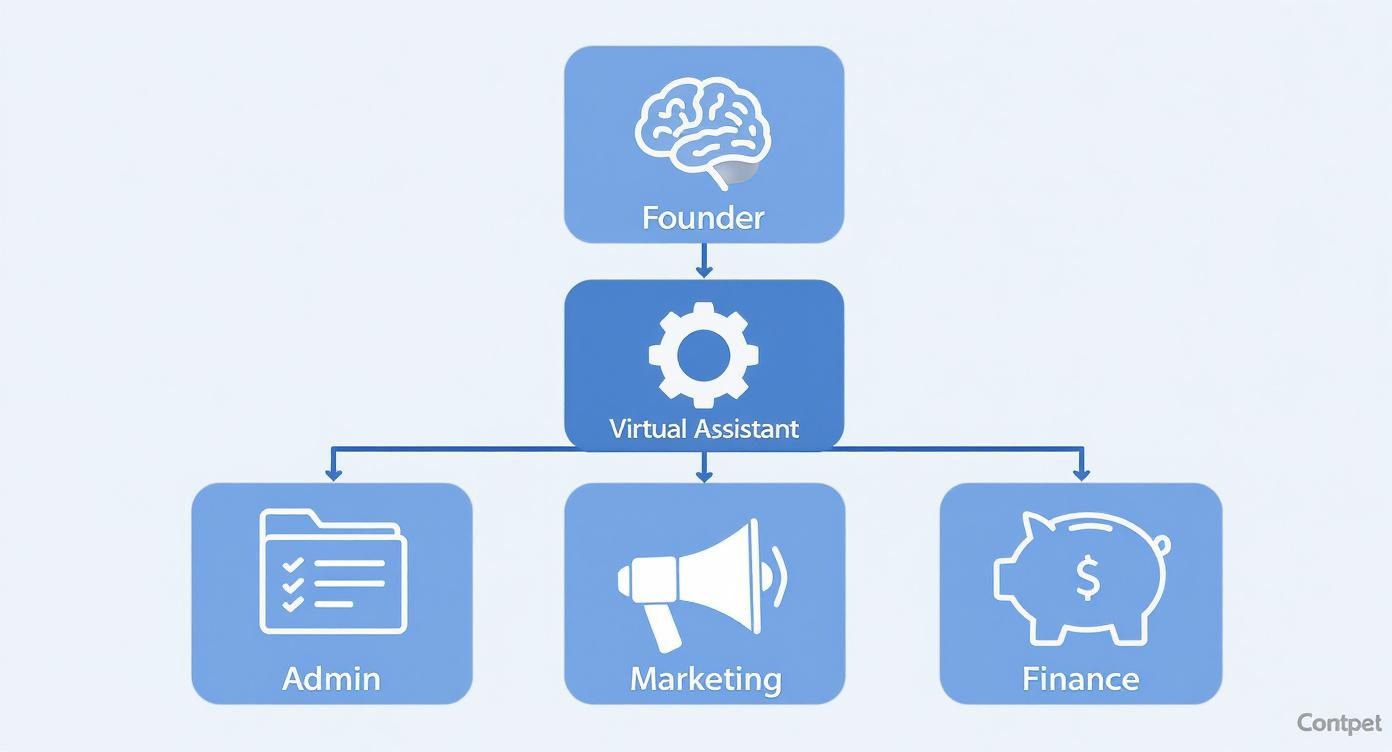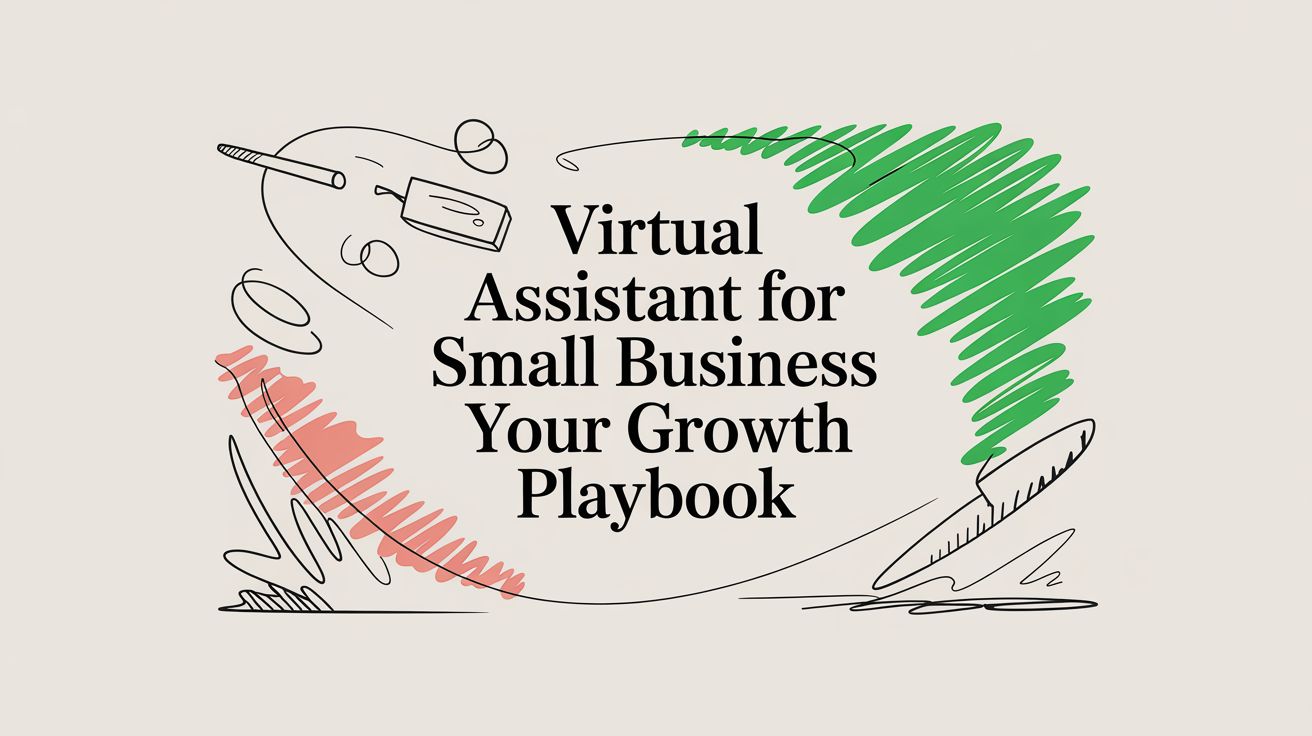As a small business owner, you’re pulled in a dozen different directions every single day. One minute you’re a marketing expert, the next you’re the bookkeeper. A virtual assistant for a small business isn’t just an extra pair of hands—they’re a strategic partner who can take essential operational tasks off your plate, giving you back your most valuable asset: time. When you work with an outsourcing partner in the USA, this integration becomes even more seamless, ensuring your assistant understands the nuances of the American market from day one.
Why Smart Businesses Are Hiring Virtual Assistants
Imagine your business is a high-performance race car. As the founder, you’re the driver. Your job is to watch the road, spot the turns, and push toward the finish line. But for that car to even run, a complex engine has to work perfectly behind the scenes, managing every system and making sure all the parts move in sync. A great virtual assistant is that engine, handling the critical inner workings that keep you in the race.
When you’re stuck answering routine emails, scheduling meetings, or chasing down invoices, you’re not driving. You’re under the hood with a wrench. These jobs are absolutely necessary, but they don’t need your specific expertise. Handing them off to a skilled professional lets you get back in the driver’s seat, where your vision and big-picture decisions actually move the needle.
Your Operational Co-Pilot for Growth
A virtual assistant is your operational co-pilot, managing the flight plan while you pilot the aircraft. They ensure the day-to-day functions are handled without a hitch, so you can concentrate on high-value work like building client relationships, refining your product, and planning your next big move. This isn’t just about offloading tasks; it’s about building a smarter, more scalable business.
Here’s what that partnership really looks like:
- Reclaiming Founder Focus: You get to shift your energy from administrative quicksand back to activities that actually generate revenue.
- Improving Operational Efficiency: Smooth, reliable workflows get established for everything from customer support to data entry.
- Scaling with Agility: You can add support exactly when you need it as the business grows, without the cost and commitment of a full-time employee.
By outsourcing routine responsibilities, business owners can save an average of 66% on operating costs. That makes a virtual assistant a powerful investment in both your schedule and your bottom line.
The Advantage of a US-Based Partner
Choosing the right co-pilot is everything. When you decide to partner with an outsourcing firm in the USA, you get a distinct advantage. A US-based virtual assistant for a small business is already in your time zone, gets the nuances of the American market, and communicates without any cultural or language gaps.
This natural alignment makes collaboration feel effortless. It cuts down on misunderstandings and gets you to full productivity much faster, making them feel like a genuine part of your team, not just a contractor on the other side of the world.
What a Virtual Assistant Can Actually Take Off Your Plate
Alright, let’s get past the vague concept of a “virtual assistant” and talk about what this actually looks like on a chaotic Tuesday morning. Think of your business as a machine with a dozen different gears that have to turn perfectly for it to move forward. A skilled VA is the person who keeps those operational gears oiled and spinning, freeing you up to actually steer the ship.
This isn’t about just tossing over a to-do list. It’s about strategically offloading entire functions of your business. When you partner with a U.S.-based provider, you’re getting more than just an extra pair of hands; you’re getting a professional who inherently gets the pace and expectations of the American market. They become a seamless extension of your team, not just a contractor.
The Administrative Backbone
Let’s be honest, the daily grind of administrative work can feel like running in quicksand. A good VA pulls you out by turning that administrative chaos into a well-oiled system. Imagine starting your day with a prioritized list of action items instead of drowning in an overflowing inbox.
Here’s what that looks like in practice:
- Inbox Management: They filter out the noise, handle routine inquiries, and flag the truly urgent messages. You only see what needs your brainpower.
- Calendar Mastery: Your VA becomes the gatekeeper of your time, expertly scheduling meetings and protecting those crucial blocks you need for deep work.
- Travel Coordination: Forget the logistical nightmare. They’ll handle everything from booking flights and hotels to building a clear, detailed itinerary for your next trip.
The Financial Command Center
Financial admin is non-negotiable, but it’s a notorious time-suck. A VA with bookkeeping chops can manage these processes with the precision they demand, giving you a crystal-clear, real-time view of your company’s financial health. No more getting bogged down in the minutiae of spreadsheets and receipts.
This infographic breaks down exactly how a founder can delegate those key operational areas.

As you can see, the VA doesn’t just do tasks—they become the operational hub that allows the founder to focus on strategy.
The Marketing Engine
Consistent marketing is the engine of growth, but it requires relentless execution. A marketing-savvy VA can keep that engine humming along by scheduling your social media, deploying email newsletters, and making basic updates to your website. Your brand stays visible without you having to step away from your core responsibilities.
It’s no surprise VAs have become so vital. The most common outsourced tasks today are email and calendar management (85%), customer service (72%), and marketing coordination (59%). These numbers show just how deeply VAs are integrated into core business operations.
A virtual assistant’s real job is to convert your operational drag into forward momentum. By taking ownership of repeatable processes in administration, finance, and marketing, they create the space you need to think strategically and drive growth.
So, how do you decide what to hand over? The table below offers a simple framework for distinguishing between the high-level strategic work you should keep and the essential operational tasks a VA can—and should—handle.
In-House vs Virtual Assistant Task Delegation
| Business Function | Strategic Owner-Led Tasks | Ideal Virtual Assistant Tasks |
|---|---|---|
| Administration | Setting company-wide policies and strategic goals | Managing daily schedules, handling emails, booking travel, organizing digital files |
| Finance | Finalizing budgets, approving major expenditures, investor relations | Bookkeeping, processing invoices, managing expense reports, payroll administration |
| Marketing | Defining brand strategy, setting campaign goals, analyzing market trends | Scheduling social media posts, managing email lists, basic content updates, reporting on metrics |
| Customer Service | Handling major client escalations, building key relationships | Responding to initial inquiries, managing support tickets, gathering customer feedback |
| Sales | Closing major deals, negotiating contracts, setting sales strategy | Lead qualification, CRM data entry, scheduling sales calls, preparing sales materials |
Delegating these operational functions isn’t about losing control; it’s about gaining focus. By entrusting these critical but repeatable tasks to a VA, you multiply your own effectiveness and direct your energy where it truly matters.
The first step is figuring out which tasks are holding you back the most. Our guide on outsourced virtual assistants is a great resource for pinpointing exactly where this kind of support will make the biggest impact on your day-to-day.
The Strategic Advantage of a US-Based Virtual Assistant
When you bring a virtual assistant for a small business on board, you’re doing more than just handing off tasks. You’re choosing a partner to work inside your core operations, and where that partner is located can make all the difference.
Choosing a US-based assistant isn’t just about convenience; it’s a strategic move. A VA who operates in the same business world you do gets up to speed faster, turning your investment into real results without the typical friction of working across continents.
Seamless Communication and Cultural Fluency
Great work comes from clear, effortless communication. A US-based VA naturally understands the nuances of American business culture, from customer service expectations to the tone you use in your emails.
There are no language barriers to navigate or cultural gaps to bridge. Your instructions land exactly as you intended, and your brand’s voice stays consistent. This shared background means your VA can feel like a true extension of your team, not a distant contractor. You’re working in the same time zones, which makes quick collaboration and real-time problem-solving a reality.
Choosing a domestic partner is a risk-reduction strategy. It minimizes misunderstandings and ensures your VA is perfectly in sync with your market, your customers, and your company culture.
Alignment with US Business Practices
Beyond just speaking the same language, a stateside partner has an intuitive feel for the American market. They’ve likely used the same software you use, understand regional trends, and are familiar with the regulations that shape your industry.
This built-in knowledge saves a massive amount of time you’d otherwise spend on training and oversight. But the benefits go even deeper, especially when it comes to legal and security protections.
- Data Security: Your sensitive business data is handled under strict US privacy laws. That provides a layer of security and peace of mind you simply can’t guarantee when working with an overseas contractor.
- Intellectual Property: Your IP is shielded by robust US laws, protecting everything from your proprietary processes to your client lists.
- Regulatory Compliance: A US-based VA understands domestic compliance standards. This is non-negotiable for anyone in regulated fields like finance, legal, or healthcare.
By partnering with a US-based virtual assistant for small business, you’re investing in someone who is already integrated into your business world. It’s a choice that builds a more secure, efficient, and resilient foundation for your company, freeing you to focus on what really matters: growth.
Your Playbook for Finding and Onboarding the Right VA

Bringing a virtual assistant into your business isn’t just about making a single hire; it’s a process. When you get it right, you build a successful long-term partnership from day one. It all starts with getting crystal clear on where you actually need the help.
Pinpoint What to Delegate
Before you even think about hiring, you need to figure out what to hand off. The best way I’ve found to do this is with a simple time audit. Spend a week tracking everything you do, then sort each task into two buckets: things only you can do, and things you just don’t enjoy.
This little exercise is incredibly revealing. You’ll quickly spot the low-impact, repetitive tasks that eat up your day. Those are the perfect candidates to offload to a virtual assistant for small business, freeing up hours of your time almost immediately.
Evaluate Your Hiring Options
Once you know what you need done, the next question is where to find your VA. For most small businesses, it boils down to two main paths, and each has its own pros and cons.
- Freelance Platforms: Marketplaces like Upwork or Fiverr offer a huge global pool of talent. This can be a great route for one-off projects, especially if you have the time to sift through profiles and manage the hiring yourself.
- Managed Agencies: An agency does all the groundwork for you—recruiting, vetting, and even training VAs. This is the way to go if you want a qualified professional ready to start without the typical hiring headaches. Partnering with a US-based outsourcing firm adds another layer of benefit, as they handle all vetting and ensure the talent pool is already aligned with American business standards.
We’re also seeing a rise in subscription-based VA services, which gives small businesses access to reliable, ongoing support. This model is a game-changer because it provides predictable costs and pre-vetted talent, letting you get help in hours, not weeks.
Design a Bulletproof Onboarding Process
Even the best hire can stumble without a solid onboarding plan. Your job is to get your new VA up to speed and feeling confident as quickly as possible. Don’t just wing it.
A well-designed onboarding process is your single best tool for setting expectations, establishing communication norms, and building a foundation of trust with your new virtual assistant.
Your onboarding should start with a “Welcome Kit” that includes essentials like company contacts, brand guidelines, and logins for any tools they’ll need. To keep everything running smoothly, it’s a good idea to explore various remote team communication tools and pick what works for your new setup.
Here’s a simple checklist to get you through the first week:
- Day 1: A friendly welcome call, introductions to the team, and a quick review of the Welcome Kit.
- Day 2: Walk them through their first key task or process.
- Day 3: Make sure they have access to all the necessary software.
- Day 4: Assign a small, self-contained project to help them score an early win.
- Day 5: Hold a weekly check-in to see how things are going and answer questions.
This kind of structure takes the guesswork out of the first few days and sets a professional tone from the very beginning. For more tips on growing your team, check out our resources to hire the right candidates for your business.
Measuring Success and Maximizing Your ROI

Bringing a virtual assistant for a small business on board is an investment in your company’s future, not just another expense. To really grasp the value, you have to look past the hourly rate and measure the actual impact on your business. The return on investment isn’t just about what you save; it’s about what you gain in focus, speed, and the freedom to grow.
The whole mindset needs to shift from, “How much does this cost?” to “What does this make possible?” There’s a reason the use of VAs has exploded, and the answer is pretty compelling. Small businesses that bring on at least two VAs report saving an average of $104,000 annually. That’s a serious financial upside. You can find more details about how small businesses are benefiting from virtual assistants on aim2assist.com.
Key Performance Indicators That Matter
To get the full picture, you need to track metrics that tie your VA’s work directly to your bottom line. These key performance indicators (KPIs) are what make the value of your investment undeniably clear. Working with a US-based outsourcing partner is a great way to set up and monitor these benchmarks, making sure their efforts are always pointed toward your biggest goals.
Here are three powerful metrics to start tracking right away:
- Founder Focus Hours: This is the most valuable commodity you have—your time. Keep a log of the hours you get back from administrative work and pour them into things only you can do, like closing a big deal or designing a new product.
- Operational Velocity: Think of this as your business’s new speed. How many more tasks are getting done each week? Count the number of support tickets closed, invoices sent, or social media posts published.
- Growth Enablement: Look for direct improvements in areas that drive growth. Are customer questions getting answered faster? Are more sales leads getting a prompt follow-up? These are clear signs your VA is improving the customer experience and strengthening your sales pipeline.
Tracking Your Return Effectively
You don’t need fancy software to monitor these KPIs. A simple shared spreadsheet can work wonders. Your VA can log their completed tasks, and you can track how you’re spending your reclaimed time. To keep everything transparent and accurately measure productivity, it’s worth learning about effective strategies for tracking virtual assistant hours.
The ultimate goal is to draw a straight line from your virtual assistant’s daily activities to tangible business outcomes. When you see operational velocity increase and your own focus hours shift to strategic work, you’ve proven the ROI.
This data-backed approach shifts your VA from a simple support role to a genuine strategic asset. By zeroing in on these concrete metrics, you can confidently maximize your return and make your investment in a virtual assistant one of the smartest business decisions you’ll ever make.
Common Questions About Hiring a Virtual Assistant
Even when you see the potential, actually bringing a virtual assistant into your business can feel like a big step. It’s natural to have a few questions before you dive in. Let’s walk through the three things that are probably on your mind.
How Much Does a Virtual Assistant Cost?
This is almost always the first question, and the honest answer is: it depends. There’s no single price tag because the cost is tied to how you engage them. Think of it less like a fixed salary and more like a flexible service plan.
- Hourly Rates: This is your pay-as-you-go option. You only pay for the time your VA is actively working on your tasks. It’s perfect if your workload has peaks and valleys or if you’re just dipping your toes into delegation.
- Retainer Packages: Here, you pre-purchase a block of hours each month, usually at a discounted rate. This is great for consistency—it guarantees your VA’s availability and makes your monthly costs predictable.
- Subscription Services: A newer model where you pay a flat monthly fee for access to a team of vetted professionals and a menu of services you can pull from as needed.
Working with a U.S.-based outsourcing firm like ours gives you access to all these flexible models. Plus, you get the added value of professionals who inherently understand the U.S. market, which is something a simple hourly rate can’t capture.
How Can I Trust a VA with Sensitive Information?
Letting someone into the backend of your business is a big deal. Trust is everything. This is a completely valid concern, but it’s one that professional VAs and agencies have built their entire business model around solving.
One of the major benefits of working with an outsourcing partner in the USA is the legal peace of mind. They operate under U.S. data privacy and intellectual property laws, which gives you a solid legal foundation for protecting your business.
Protecting your sensitive information isn’t an afterthought; it’s the starting point. A professional VA relationship is built on clear agreements and robust security practices from day one.
Here’s how you build that wall of security:
- Non-Disclosure Agreements (NDAs): This is standard practice. A signed NDA is a legally binding contract that makes the rules of confidentiality crystal clear right from the start.
- Secure Password Managers: Never email a password. Ever. Use an encrypted tool like LastPass or 1Password to grant access to accounts without ever revealing the actual credentials.
- Thorough Vetting Processes: This is where a good agency shines. Reputable U.S.-based firms conduct deep background checks and vetting on every single assistant, so you know who you’re working with.
Freelancer vs. Managed Agency: What’s the Difference?
Finally, many business owners get stuck on whether to hire an independent freelancer or partner with a managed agency. They might seem similar, but the experience is worlds apart.
When you hire a freelancer, you’re on your own. You handle the recruiting, the interviewing, the training, and all the day-to-day management. It gives you a direct one-on-one relationship, but the administrative burden falls entirely on you.
A managed agency is your built-in support system. They do all the heavy lifting of finding and vetting top talent for you. But the real value is what happens next: they provide ongoing oversight, continuous training to keep skills sharp, and—critically—backup support if your primary VA is sick or on vacation. A USA-based partner amplifies these benefits by providing a culturally aligned talent pool and a secure, domestic legal framework. This built-in reliability and quality control is tough to achieve on your own, making an agency a smart choice for any virtual assistant for small business owner who is serious about long-term, scalable growth.









